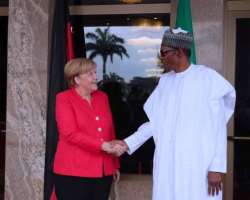Merkel’s visit: Pivotal lessons for Nigeria

Last week, German Chancellor Angela Merkel visited Nigeria and two other West African countries to, amongst other reasons, discuss and implement viable economic and social strategies to tackle irregular migration to Europe from the sub-region.
Nigeria and indeed Africa has become a major origin of migrants seeking greener pastures in Europe through irregular means such as the Libya, Morocco, and Mediterranean routes which have accounted for several woes than wonders.
Just this year, over 1,500 irregular migrants are either dead or missing while attempting to cross the Mediterranean Sea into Europe, this is according to the International Organization on Migration. This figure, however, does not capture those lost in transit, as the whole process is largely undocumented. Thankfully, this is the lowest casualty figure recorded over the last five years.
While the beat of irregular migration seems to be gradually fading, several stakeholders such as Germany and Europe at large are still active in managing the situation, hence, the visit of the Chancellor. To this end, it is imperative for Nigeria to glean some lessons from Merkel’s visit and the global outlook to managing irregular migration.
Survival is at the core human existence, where and when such is threatened or unassured, a flight or fight mode is assured to erupt. The former is what many Nigerian youths have resolved to - flight to other countries perceived to possess and present better conditions of living and survival.
Undoubtedly, the state of living and surviving in Nigeria is at an all-time low cadence. This is marked by a recent international rating of Nigeria’s poverty index ahead of India, revealing that over half of Nigeria’s 196 million citizens are living below the poverty line. Therefore, Nigeria and indeed Nigerians cannot survive and sustain through a dysfunctional social space for the over seventy percent youth population of the country. This remains a critical reason for irregular migration.
The lack and limitedness of economic opportunities have been a major push factor for irregular migrants and many potential irregular migrants say they will drop their migration intent if provided with viable economic opportunities here in Nigeria, this is according to a research by the Migrant Project.
Germany has taken the lead in providing domesticated avenues to engage potential migrants and young Nigerians in general. The Nigerian government needs more forthrightness in managing and advancing easily accessible economic opportunities in order to checkmate irregular migration from the country. Social and economic opportunities are a sure component of checking human capital flight and irregular migration.
As with Nigeria, every country of the world is faced with diverse challenges. Germany, as well as other European countries, are faced with issues of unemployment and economic downturn, thereby, the remark of the German Chancellor: “There is the need to improve on the situation at home and make young people know how dangerous it is to leave their countries. Many stories told about Germany are not true.”
Over blotted and unrealistic tales of life and survival in Europe is yet another factor that pulls many Nigerians to embark on irregular journeys with the intent to also catch with such luxurious lifestyle, when in actuality, life is not always as easy as described anywhere in the world.
Communication is at the heart of social development and human change. The Nigerian government needs more human-centric and behavioural change approach to managing and mitigating issues of citizens disappointments, hopelessness and intent to migrate irregularly.
If done legally, migration is not a bad thing. But the act of traveling illegally comes with extensive repercussions including waste of time, money, safety, livelihood, resources and possibly life, with disadvantages for the country and humanity. Therefore, Nigerians must embrace safe and legal migration means of at best explore homegrown alternatives to illegal migration.
